- Home
- Bret Easton Ellis
Lunar Park Page 2
Lunar Park Read online
Page 2
The two main events during the next phase of my life were the hurried publication of a second novel, The Rules of Attraction, and my affair with the actress Jayne Dennis. The Rules of Attraction was written during my senior year at Camden and detailed the sex lives of a small group of wealthy, alienated, sexually ambiguous students at a small New England liberal arts college (so like Camden itself that this is what I called the fictional university) during the height of the Reagan eighties. We followed them as they wandered from orgiastic party to orgiastic party, from one stranger’s bed to another, and the text catalogued all the drugs devoured, all the alcohol guzzled, how easily they drifted into abortions and vast apathy and skipping classes, and it was supposed to be an indictment of, well, really nothing, but at that point in my career I could have submitted the notes I had taken in my junior year Virginia Woolf course and would still have received the huge advance and copious amounts of publicity. The book was also a best seller, though not as successful as Less Than Zero, and the press became even more fascinated with me, and by the decadence portrayed in the book and how it seemed to mirror my public lifestyle as well as the decade we were all trapped in. The book cemented my authority as the spokesman for this generation, and my fame grew in direct proportion to the number of copies the book sold. It all kept coming: the cases of champagne consumed, the suits Armani sent over, the cocktails in first class, the charting on various power lists, the court seats at Lakers games, the shopping after hours at Barneys, the groupies, the paternity suits, the restraining orders against “determined fans,” the first million, the second million, the third million. I was going to start my own line of furniture. I was going to have my own production company. And the spotlight’s white glare kept intensifying, especially when I started dating Jayne Dennis.
Jayne Dennis was a young model who had seamlessly made the transition to serious actress and had been steadily gaining recognition for her roles in a number of A-list projects. Our paths had crossed at various celebrity functions, and she had always been extremely flirtatious—but since everyone was flirting with me at that point in my life, her interest barely registered until she arrived at a Christmas party I threw in 1988 and basically hurled herself at me (I was that irresistible). At the after-party at Nell’s I found myself making out with her in one of the club’s front booths and then whisked her back to my suite at The Carlyle (it took the caterers two days to decorate the condo and three days to clean it up—there were five hundred guests—so I moved into a hotel the week of that party), where we had sex all night and then I had a plane to catch the next morning to L.A. for the holidays. When I returned to New York we officially became a high-profile couple. We could be seen at an Elton John AIDS benefit concert at Madison Square Garden, we were photographed at a Hampton’s polo match, we were interviewed by Entertainment Tonight on the red carpet at the Ziegfeld premiere of the new Eddie Murphy comedy, we sat in the front row at a Versace fashion show, paparazzi followed us to a friend’s villa in Nice. Though Jayne had fallen in love with me and wanted to get married, I was simply too preoccupied with myself and felt the relationship, if it kept running its course, would be doomed by summer. Besides her neediness and self-loathing, there were other insurmountable obstacles: namely drugs and, to a lesser extent, massive alcohol consumption; there were other girls, there were other boys; there was always another party to get lost in. Jayne and I broke up amiably in May of 1989 and kept in touch in a sad/funny sort of way; there was a continuing wistfulness on her part and a high level of sexual interest on mine. But I needed my space. I needed to be alone. A woman wasn’t going to interfere with my creativity (plus, Jayne didn’t add anything to it). I had started a new novel that was beginning to demand most of my time.
What’s left to say about American Psycho that hasn’t already been said? And I feel no need to go into great detail about it here. For those who weren’t in the room at the time, here’s the CliffsNotes version: I wrote a novel about a young, wealthy, alienated Wall Street yuppie named Patrick Bateman who also happened to be a serial killer filled with vast apathy during the height of the Reagan eighties. The novel was pornographic and extremely violent, so much so that my publishers, Simon & Schuster, refused the book on grounds of taste, forfeiting a mid-six-figure advance. Sonny Mehta, the head of Knopf, snapped up the rights, and even before its publication the controversy and scandal the novel achieved was enormous. I did no press because it was pointless—my voice would have been drowned out by all the indignant wailing. The book was accused of introducing serial killer chic to the nation. It was reviewed in the New York Times, three months before publication, under the headline “Don’t Buy This Book.” It was the subject of a 10,000-word essay by Norman Mailer in Vanity Fair (“the first novel in years to take on deep, dark, Dostoyevskian themes—how one wishes this writer was without talent!”). It was the object of scornful editorials, there were debates on CNN, there was a feminist boycott by the National Organization of Women and the obligatory death threats (a tour was canceled because of them). PEN and the Authors Guild refused to come to my rescue. I was vilified even though the book sold millions of copies and raised the fame quotient so high that my name became as recognizable as most movie stars’ or athletes’. I was taken seriously. I was a joke. I was avant-garde. I was a traditionalist. I was underrated. I was overrated. I was innocent. I was partly guilty. I had orchestrated the controversy. I was incapable of orchestrating anything. I was considered the most misogynist American writer in existence. I was a victim of the burgeoning culture of the politically correct. The debates raged on and on, and not even the Gulf War in the spring of 1991 could distract the public’s fear and worry and fascination from Patrick Bateman and his twisted life. I made more money than I knew what to do with. It was the year of being hated.
What I didn’t—and couldn’t—tell anyone was that writing the book had been an extremely disturbing experience. That even though I had planned to base Patrick Bateman on my father, someone—something—else took over and caused this new character to be my only reference point during the three years it took to complete the novel. What I didn’t tell anyone was that the book was written mostly at night when the spirit of this madman would visit, sometimes waking me from a deep, Xanax-induced sleep. When I realized, to my horror, what this character wanted from me, I kept resisting, but the novel forced itself to be written. I would often black out for hours at a time only to realize that another ten pages had been scrawled out. My point—and I’m not quite sure how else to put this—is that the book wanted to be written by someone else. It wrote itself, and didn’t care how I felt about it. I would fearfully watch my hand as the pen swept across the yellow legal pads I did the first draft on. I was repulsed by this creation and wanted to take no credit for it—Patrick Bateman wanted the credit. And once the book was published, it almost seemed as if he was relieved and, more disgustingly, satisfied. He stopped appearing after midnight gleefully haunting my dreams, and I could finally relax and quit bracing myself for his nocturnal arrivals. But even years later I couldn’t look at the book, let alone touch it or reread it—there was something, well, evil about it. My father never said anything to me about American Psycho. Though oddly enough, after reading half of it that spring, he sent my mother a copy of Newsweek with the cover that asked, over the angelic face of a baby, “Is Your Child Gay?” unaccompanied by any kind of note or explanation.
The death of my father occurred in August of 1992. At the time I was doing the Hamptons in a $20,000-a-month cottage on the beach in Wainscott, where I was trying to work through my writer’s block while preparing for weekend guests (Ron Galotti, Campion Platt, Susan Minot, my Italian publisher, and McInerney), ordering the forty-dollar plum tart from the specialty bakery in East Hampton and picking up the two cases of Domaines Ott. I was trying to stay sober but I’d started opening bottles of chardonnay at ten in the morning, and if I’d drunk everything the night before, I would sit in the Porsche I’d leased for the summer in
a Bridgehampton parking lot waiting for the liquor store to open, usually sharing a cigarette with Peter Maas, who was waiting there too. I had just broken up with a model over a bizarre argument while we were barbecuing mackerel—she complained about the drinking, the spacing out, the exhibitionism, the gay thing, my weight gain, the paranoia. But it was the summer of Jeffrey Dahmer, the infamous homosexual/cannibal/serial killer from Wisconsin, and I became positive that he had been under the influence of American Psycho, since his crimes were just as gruesome and horrific as Patrick Bateman’s. And since there had been a serial killer in of all fucking places Toronto, for Christ’s sake, who had read the book and based two of his murders on scenes from it, I made a number of frantic, drunken phone calls to my agent at ICM as well as to my publicists at Knopf to make sure this wasn’t the case (it wasn’t). And yes, it was true, I had gained forty pounds—I was so sunburned and fat that if you had drawn a face on a giant pink marshmallow and plopped it in front of a laptop, you could not have told the difference between the two of us. And, of course, being this out of shape, I was prone to skinny-dipping in the Atlantic just fifty yards from my $20,000-a-month cottage, and yeah, I had also developed a minor crush on a teenage guy who worked at Loaves and Fishes. So Trisha’s leaving me was semiunderstandable. Calling me a “fucking lunatic” and speeding away in that leased Porsche was not.
And then the summer was interrupted by a phone call in the middle of the night. He was found naked by the twenty-two-year-old girlfriend on the bathroom floor of his empty house in Newport Beach. That was all we knew.
I had no idea what to do, who to call, how to cope. I collapsed into shock. Someone had to remove me from that cottage and get me back to California. There was eventually only one person who could do all this for me—or, more pointedly, would. So Jayne left the set of a movie in Pennsylvania she was costarring in with Keanu Reeves and made plane reservations on MGM Grand and dragged my shivering hulk out of the Hamptons and flew to L.A. with me—all within twenty hours of hearing about my father’s death. And that night, at the house in Sherman Oaks that I grew up in, drunk and terrified, I brutally made love to her in my childhood room while we both wept. Jayne returned the next day to the set in Pennsylvania. Keanu sent me flowers.
My father had made me trustee of his estate, which was worthless, and he also owed millions in back taxes, so there was a protracted legal battle with the IRS (they could not understand how someone who had made $20 million in the last six years of his life had spent it all—but this was before we found out about the rented Learjet and all the bad art) that kept me in Los Angeles for several months, locked in an office in Century City with three lawyers and half a dozen accountants until all the financial matters were cleared up. In the end I was left with two Patek Philippe watches and a boxful of oversized Armani suits, as well as a monumental relief that he was gone. (My mother and sisters—nothing.) The autopsy revealed that he had suffered a massive stroke at 2:40 a.m., though the coroner was mystified by certain irregularities. No one wanted to pursue these irregularities and he was cremated immediately. His ashes were put into a bag—even though his (invalid) will stated that he wanted his children to spread them at sea off the coast of Cabo San Lucas, where he vacationed frequently—and we stored the ashes in a safe-deposit box in a Bank of America on Ventura Boulevard next to a dilapidated McDonald’s. When I brought some of the Armani suits to a tailor to be altered (I had dropped all the weight I had gained that summer in a matter of weeks) I was revolted to discover that most of the inseams in the crotch of the trousers were stained with blood, which we later found out was the result of a botched penile implant he underwent in Minneapolis. My father, in his last years, due to the toxic mix of diabetes and alcoholism, had become impotent. I left the suits with the tailor and drove back to Sherman Oaks in tears, screaming while punching the roof of the Mercedes as I swerved recklessly through the canyons.
And when I returned to New York, I was told by Jayne that she was pregnant and that she intended to keep the child and that I was the father. I begged her to have an abortion. (“Change it! Fix it! Do something!” I screamed. “I can’t be doing this! I’ll be dead in two years! Don’t look at me like I’m crazy!”) Children had voices, they wanted to explain themselves, they wanted to tell you where everything was—and I could easily do without witnessing these special skills. I had already seen what I wanted and it did not involve children. Like all single men the first priority was my career. I had a fantasy bachelor’s life and wanted to keep it. I raged at Jayne, confronted her with entrapment, insisted it wasn’t mine. But she said she expected as much from me and had the child prematurely the following March at Cedars-Sinai, in L.A., where she was now living. I saw the child once during its first year—Jayne brought him over to the condo on 13th Street in a pathetic attempt at bonding when she was in town for the premiere of the movie she had made with Keanu Reeves the previous summer. She had named him Robert—Robby. Again I raged at her and insisted the child wasn’t mine. She asked, “Then who the hell do you think the father is?” I immediately made a connection and pounced on it. “Keanu Reeves!” I shouted. (Keanu had been a friend of mine when he was initially cast in Less Than Zero, but he was replaced by Andrew McCarthy when the studio producing the movie—Twentieth Century–Fox—scored a hit in the spring of 1987 with Mannequin, a low-budget sleeper which starred McCarthy, and was produced, ironically, by the father of the girl the character Blair—the heroine of Less Than Zero—was based on; my world was that small.) I threatened to sue Jayne if she asked for child support. Since I refused to participate in any testing, she hired a lawyer. I hired a lawyer. Her lawyer argued that “the child bears a striking resemblance to Mr. Ellis,” while my lawyer countered, reluctantly, at my urging, with “said child bears a striking resemblance to a certain Mr. Keanu Reeves!” (the exclamation point being my idea; blowing my relationship with Keanu because of this, not my idea). Tests I was legally obliged to undergo proved that I was the father, but I claimed that Jayne had misrepresented the facts when she said she was using contraception. “Ms. Dennis and Mr. Ellis were in a non-exclusive relationship,” my lawyer argued. “Regardless of Mr. Ellis being the father, it is her choice to be a single mother.” I learned in cases such as these that ejaculation was the legal point of no return. But one morning, after a particularly acrimonious phone call between my lawyer and Jayne’s, Marty hung up the phone, stunned, and looked at me. Jayne had given up. She no longer expected any child support and promptly dropped her lawsuit. It was at that moment in my lawyer’s office at One World Trade Center that I realized she had named the child after my father, but when I confronted her about it later that day, after we had tentatively forgiven each other, she swore it had never occurred to her. (Which I still do not believe, and which I am certain is the reason that the following events in Lunar Park happened—it was the catalyst.) What else? Her parents hated me. Even after it was proven that I was the father, Jayne’s last name remained on the birth certificate. I started wearing Hawaiian shirts and smoking cigars. Jayne had another child five years later—a girl named Sarah—and again the relationship with the father did not work out. (I knew the guy vaguely—a famous music executive in L.A.; he was a nice guy.) In the end, Jayne seemed practical and maternal and stable. We amiably kept in touch. She was still in love with me. I moved on.
Jayne always demanded Robby’s name not be connected with mine in any of the press I did and of course I agreed, but in August of 1994, when Vanity Fair assigned a profile to run when Knopf published The Informers, that collection of short stories I had written when still at Camden, the reporter suggested who Robby’s father might be and in his first draft—which ICM suspiciously got a peek at—cited a “reliable source” as saying that Bret Easton Ellis was in fact Robby’s dad. I relayed this information to Jayne, who called my agent, Binky Urban, and the head of Knopf, Sonny Mehta, to demand that this “fact” be excised, and Graydon Carter—the editor of Vanity Fair and also a friend—agr
eed to cut it, much to the chagrin of the reporter who had “endured” a week with me in Richmond, Virginia, where I supposedly was hiding out at a friend’s house. Actually, I was secretly attending the Canyon Ranch that had recently opened there to get in shape for the brief book tour I’d promised to do for Knopf to support The Informers. That information never made it into the article, either.

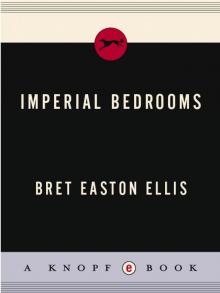 Imperial Bedrooms
Imperial Bedrooms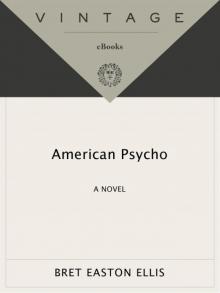 American Psycho
American Psycho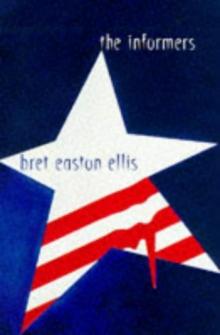 The Informers
The Informers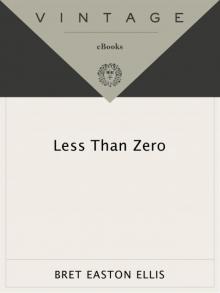 Less Than Zero
Less Than Zero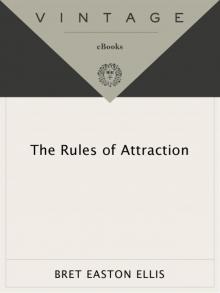 The Rules of Attraction
The Rules of Attraction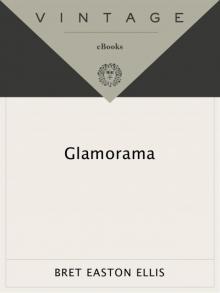 Glamorama
Glamorama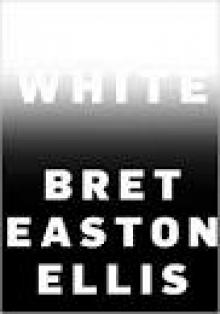 White
White